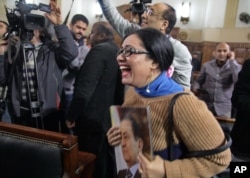An Egyptian appeals court has overturned a conviction on charges of embezzlement against former President Hosni Mubarak Tuesday, opening the door to his eventual release from detention at a Cairo military hospital. The case will, however, be retried.
Cheers and applause broke out in the court room, after Egypt's highest appeals court threw out a previous ruling against Mubarak and his two sons on charges of fraud and embezzlement. Mubarak received a three-year prison sentence in the case.
The former president's lawyer, Farid Dib, smiled broadly after the decision was announced and told journalists that the ruling would clear the way for Mubarak's release. It was not immediately clear when that would be, however, and the court did not order him to be freed.
Supporters of the former president waved his picture above their heads and a group of women ululated to celebrate. One woman in the court room told Youm al Sabah newspaper that she was “relieved by the verdict,” and had considered the conviction “unfair, both legally and on a human level.”
Outside the court, on a street leading to Cairo's iconic Tahrir Square, supporters and opponents of the veteran Egyptian ruler shouted at each other and traded insults. The exchange was a far cry from the rock-throwing and fisticuffs between the two groups when Mubarak first went on trial.
More serious charges of killing protesters during the January 2011 revolution which toppled him were thrown out, after a retrial found him not guilty. But prosecutors have appealed the dismissal of charges, leading to the possibility of yet another trial.
Mubarak critics believe history has already judged him.
Egyptian editor and publisher Hisham Kassem said that he thought the man who ruled Egypt for 30 years was guilty of more than just “corruption,” but malfeasance in office.
"This man's biggest crime, apart from corruption, is incompetence. He had been a care-taker president or a charge d'affaires for 30 years and never cared to step down. Now, in a job like yours or mine there is always damage from incompetent people, but when you're the president of a republic, your incompetence means malnutrition, poverty, misery, etc. and what this man has inflicted upon the country is enormous," said Kassem.
Paul Sullivan, who teaches at Georgetown University in Washington, DC, pointed out that “Egypt's legal system sometimes seems to move in mysterious ways,” but that a retrial indicates “there must have been some evidential, procedural or legal justification.”





